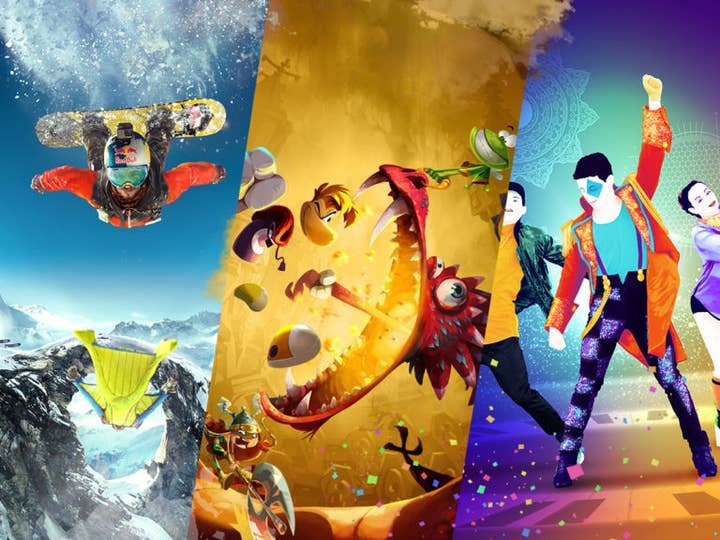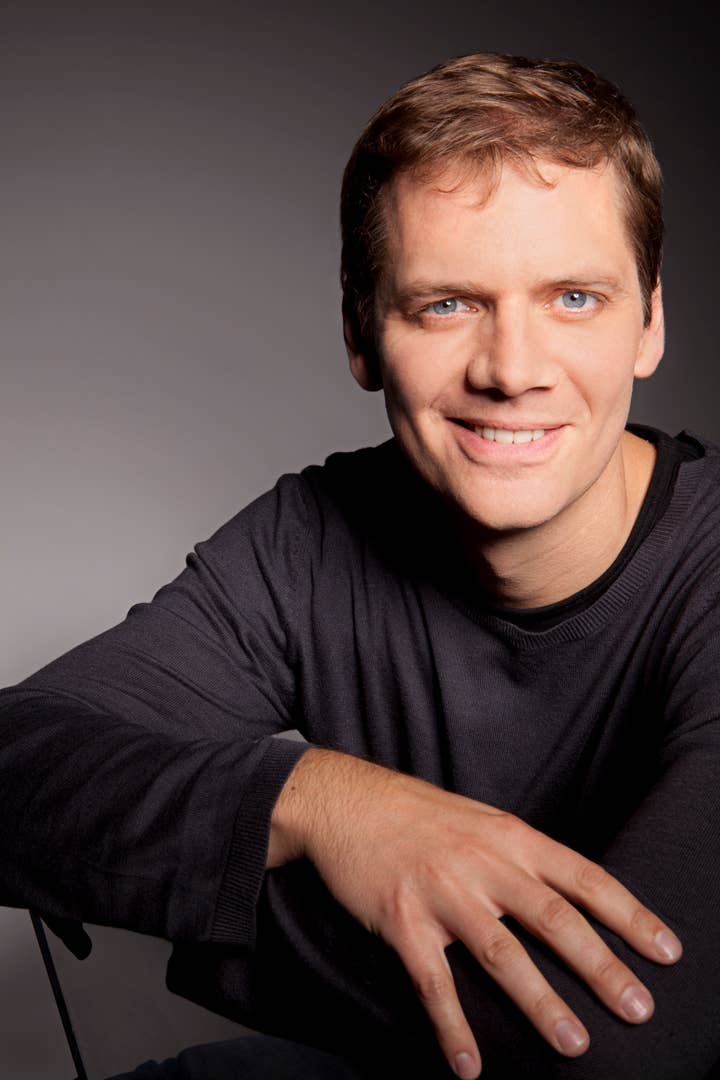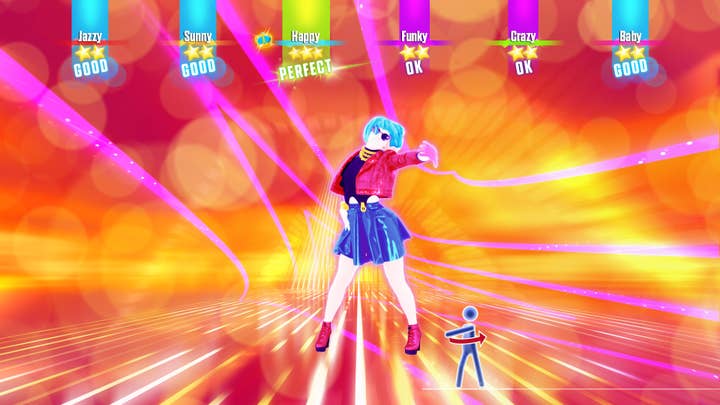Ubisoft: “We're confident Nintendo can create a bridge between mobile and TV”
The publisher on the Switch price, the launch line-up, development challenges and why it doesn't have a new IP at launch
There was a lot to digest around the Nintendo Switch announcement last week.
Those that managed to get hands-on with the machine - including ourselves - were generally impressed with the build quality and functionality of the console. But that was tapered with concerns over its slight launch line-up and the pricing of the hardware, games and accessories.
Switch feels like a games machine that could appeal to a large mainstream crowd, but the costs are a barrier to that happening.
In terms of third-party support, it's not clear if Nintendo has managed to do much in terms of convincing the big publishers to come on-board. Activision is bringing Skylanders, EA has returned to the fold with FIFA and Bethesda is making its debut on a Nintendo machine with Skyrim. Yet these companies have so far committed just one game each - it'll be interesting to see what they have at E3.
Of course, one publisher which has committed in a big way is Ubisoft. The firm announced three games for Switch (Just Dance, Rayman Legends and Steep), far more than any other third-party. However, even this suggests some caution. All of these games are ports of previous Ubisoft titles (Rayman Legends is over three years old.), while at the launch of both Wii and Wii U, Ubisoft had original properties in the form of Rayman Raving Rabbids, Red Steel and ZombiU. Shortly after the Switch reveal, GamesIndustry.biz spoke to Xavier Poix, the man in charge of Ubisoft's French studios, to better understand the expectations and plans for Nintendo's new machine.
GI.biz: What were your thoughts after the reveal of the Switch?
Xavier Poix: Every launch of a console, especially a Nintendo console for me, is an event. It is a console that we have been working on for some time. We have a very long history between the French Ubisoft studios - especially the Paris and Montpellier studios - and Nintendo. It is the third Nintendo console that will arrive with some Ubisoft titles at launch. On Wii, we had Red Steel and Rayman Raving Rabbids, and Wii U there was ZombiU, and now with Switch we have a few titles for launch and later. And of course we have more plans for the future. So it is an exciting moment. It will be interesting to see how the gamers, and not only the Nintendo fans but the whole market, will respond to it. Nintendo has proved it can surprise everybody. Even though we knew some aspects of the console, we were surprised by the high quality games coming. Plus, there are some very interesting features for it.
What I was very happy to hear about was the fact that Nintendo has followed its strategy of enlarging the gaming audience, with a console that could be appealing to a very broad audience of gamers. Yes, Nintendo fans first, but also in the longer term a more casual audience. The portfolio of games they showed reflected that.

GI.biz: The hardware and software seemed expensive. Do you still see the target market as kids and families?
Xavier Poix: It will still be for kids. The console itself is very modern and it can really answer the need of wanting some high quality gaming experience on your couch at home, with long-sessions, as well as being able to take it with you into another room, or on the bus. This should definitely appeal to a younger audience. I think there will be room for everyone. I'll be interesting to discover how people will use this on-the-go feature. That is why games like Rayman and Just Dance are good titles for this console, because I'd like to know how people will play them. Rayman Legends, for instance, is a game that has DNA that is very similar to Switch. It is a game you can play on the big screen at home, with yourself and others. But you can also see this easily being played on the smaller Switch screen, and even in multiplayer. We imagine that, with the smaller screen, people will be playing for shorter play sessions, and Rayman Legends is a game that allows you to do both long and short play sessions.
"Today, people are spending €800 on the new iPhone. It shows that people are eager to spend more money than previously on very high end, interesting new things that they can carry with them."
In the future, we will have to manage and look at how people are playing on Switch. No one can tell what the breakdown will be between playing on the couch - for what I imagine will be longer play sessions - and playing on-the-go for shorter sessions. Switch games need to think about that.
GI.biz: Sure, but doesn't the price of the machine, and its games and accessories, potentially make it unappealing for anyone who isn't a core gamer?
Xavier Poix: Today, people are spending €800 on the new iPhone. It shows that people are eager to spend more money than previously on very high end, interesting new things that they can carry with them. I'm not saying it wouldn't be better at a cheaper price, but I think we can count on Nintendo making sure that the software that will be linked with Switch will be more and more interesting.
GI.biz: Although you've announced three Switch games, with Wii and Wii U you developed completely original properties especially for those machines. Why not this time?
Xavier Poix: First of all, I think these are games that are a good fit the platform, even though we haven't made an announcement of a brand new title. When you think about Just Dance for instance, that game was brought to the Wii first and uses the whole motion gaming aspect. But Just Dance is about playing with anyone and anytime, it is about accessibility, and what is interesting is that Switch brings that anywhere aspect to the table. So the ability that the gamse had on Wii and Wii U in terms of bringing people together into a room, well now that room can be anywhere. The room you want to play Just Dance in can be a kitchen or a garden, it can be anywhere.
The Switch has been made for Just Dance. Just Dance has sold more than 65m units, it has had more than 100m players that have used it. In the Switch box today, you have two Joy-Con controllers, so right from the first day you can play two player Just Dance - with each person holding a Joy-Con. Of course you can play in front of the TV, and also play on the smaller screen, which means you can now have a Just Dance party almost anywhere. It's the perfect match for that game.
So we are bringing titles that we think fit with what Switch is all about. Of course, in the future we have other things that we will be very happy to share with you at a later date.
GI.biz: In terms of your open world titles, you're developing Steep for Switch. Why choose that over Watch Dogs 2 or The Division? Is it because of the violent nature of those other games?
Xavier Poix: Sorry to come back to the same point, but Steep has the same philosophy of Switch already in its DNA. Steep is about the freedom of discovering the alps, it is about doing multi-sport, it is about both long gameplay sessions and short sessions, and it is about sharing the experience with friends via sending them challenges or images - which the Steep does with its share feature.
Switch also brings the mobility aspect, and Steep is missing that. Imagine that you can keep having the Steep experience when you go to another room? For me, Steep was a no-brainer for Switch. In terms of audience, Steep is a good example of attracting a large audience, including older gamers who perhaps used to play SSX or other games like that, and you're right, it should attract a new, younger audience.
"Nintendo's strategy is to have a portfolio of strong games that will be released month after month, which I think is a good strategy."
GI.biz: What about the launch line-up? There are concerns that it's lacking in content.
Xavier Poix: Nintendo's strategy is to have a portfolio of strong games that will be released month after month, which I think is a good strategy. If I remember correctly, with the Wii U, there were many titles at launch which lacked the quality to engage the player, they didn't understand why it was different. In this case, I think Nintendo has proposed a good portfolio. It is a good way of moving forward.
GI.biz: A lot of that original Wii audience has moved onto other platforms and devices - particularly mobile. What makes you think Switch can win them back?
Xavier Poix: Today, we have two ways of playing - and a lot of people are doing both. There is the high-end, high value, experience that you have at home in front of your TV - in multiplayer or not. But when the TV isn't there anymore, if someone else is using it for example, then you are left alone with your mobile phone. So there is a need for Switch, and we probably don't realise it right now, which is what makes this so interesting. There is a promise of keeping the player in the world that he or she loves. Switch can really change the way people are interacting with their games and the worlds we are creating.
I am confident Nintendo can create a bridge between the worlds of mobile and TV. Between the desire to play on the TV, but also the need to play somewhere else because you can't be in front of your TV all the time.
GI.biz: Another publisher described Switch to me as a 'lifestyle gaming device'. It fits around people's busy lives.
Xavier Poix: That is the anywhere aspect. We have never really had that aspect in the past. Before, if you are not in the living room, the anywhere option was only really mobile. Now you have another choice.

GI.biz: You said at the start of the interview that the French studios in particular have supported Nintendo. Why is that?
Xavier Poix: First, we love Nintendo. A lot of us got into games developing because of Nintendo. Also in France, we have a big relationship with Japan and its culture. There is the same love of food, and the same love of comic books - even though there is a big difference between manga and the French comic books. But there is something there. Hayao Miyazaki [Japanese artist and film director] is very well known in France. So I think there is a match in the artistic direction, and a match in the cartoony-style of Nintendo and what we like to create.
But more importantly, we love in France mixing creativity and innovation. There is one console provider that is trying to do that and that is Nintendo. It is a company that very often wants to bring a new way of playing to the table. Since we love to mix this hardware innovation with our creativity, it is exciting. With Wii, we found out about that some time in advance and when we started to play with motion controls, we had so many ideas. That's why you had Red Steel in one hand, which is a more hardcore game, and the Rabbids on the other hand, which was a case of: 'We have so many ideas, we need one game to fit them all in'.
" The only thing we can do is test a lot on both screens, and make sure that when we develop, we develop with the two screens in our heads and in front of our eyes."
GI.biz: I spoke to one of your colleagues last year - Tommy Francois [director of IP Development based in France] - who told me that Ubisoft had asked non-gamers what they didn't like about games, to try and work out how to appeal to them. One of the answers he received was that they didn't like the fact you are always looking at a screen and not each other, even in multiplayer. When I played [Switch launch title] 1-2-Switch, I couldn't stop thinking about that quote, because that game involved very little screen time. I'm not sure if it will resonate with a larger market, but it was certainly an interesting experience.
Xavier Poix: You're totally right. When we first started working on the Wii, which was ten years ago, and we brought out the Rabbids party game - I don't know if you remember it? The whole principle of it was to make the most of the motion features, and do things that Nintendo wouldn't dare to do with these games. And what was interesting was that when we playtested it, a lot of the fun came from looking at people playing. Switch can be another step in that.
People really need to test the Switch. Some of what it promises cannot be properly understood without playing it. The rumble aspect that was shown in the video, with the ice in the glass, that is an example of one of the features that you cannot feel without touching it. There is room for lots of new and interesting ideas in the future.

GI.biz: When it comes to building games for Switch, how do you approach the two screen size challenge. Do you build for the handheld first and then upscale it to the TV, or the other way around?
Xavier Poix: That is actually something that has been on our minds for months and months. Each of our Switch games has its own methodology in terms of that - and many of the games we have are already built for the big screen. It depends on how the HUD and character fits with the screen. Whether it is the big screen or the small screen, the game needs to be accessible. The HUD needs to be clear. So we try to maximise and optimise the best quality on every screen. And this is something new for us. We have experienced it a little bit with the Wii U. We played with the of idea of having two HUD screens for ZombiU - one of the big screen and one for the Gamepad. The mobile experiences that we have also helps in finding ways to make sure players can enjoy the games on both screens. But the difference with the Switch is that the HUD needs to be the same on both screens.
"The message of the Wii U wasn't clear enough. I am really confident that the messaging itself - which was key to the success of Wii - is there for the Switch."
There's no real recipe. The only thing we can do is test a lot on both screens, and make sure that when we develop, we develop with the two screens in our heads and in front of our eyes.
GI.biz: With Wii U, you supported that machine in a big way initially, but then when the sales didn't arrive the support dried up. What makes you think Switch won't suffer the same fate?
Xavier Poix: The message of the Wii U wasn't clear enough. I think what they really did well with the Wii is that they found a new system, a new way of playing and an easy way of showing that to every audience. In terms of the Wii U, the idea of playing with two screens, and with a controller that is bigger than usual, it is something that is very hard to explain. It is ok when you play games that use this feature, because you understand, but it's not something you can understand very easily by just seeing it. I think the Switch, from day one - which I think is why they introduced the Switch at first without any other information - is to see if the message is something that people can easily understand. And for me it is simple. You know the handheld console, you know the home console, the Switch is the bridge. It is a home console on-the-go. It is a very simple message that anyone can understand. Of course there are more features that you'd need to play to understand it properly, but I am really confident that the messaging itself - which was key to the success of Wii - is there for the Switch.
